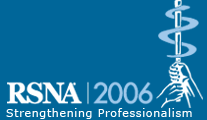
Abstract Archives of the RSNA, 2006
SSJ01-03
A True Screening Environment for Review of Interval Breast Cancers: A Pilot Study to Reduce Bias
Scientific Papers
Presented on November 28, 2006
Presented as part of SSJ01: Breast Imaging (Mammography)
Paula Beth Gordon MD, Presenter: Expert Advisory Committee, The Medipattern Corporation
Stockholder, mdconversation
Advisor, mdconversation
Marilyn Borugian PhD, Abstract Co-Author: Nothing to Disclose
Linda Warren-Burhenne MD, Abstract Co-Author: Stockholder, R2 Technology, Inc
Expert Advisory Committee, R2 Technology, Inc
To determine the feasibility of creating a true screening environment for blind review of interval breast cancers, and to test whether the proportion classified as missed is different compared with the standard informed “blind” review.
Interval cancer films were included in the daily work of radiologists in a high-volume screening centre. Film identifiers were changed to conceal the fact that the films were not current, and each of 3 experienced radiologists read the films in the normal screening environment, without knowing it was a blind review (“uninformed review”). No more than one interval cancer at a time was added to each day’s work. Results were compared with the normal review procedure, which had already been conducted, in which films of interval cancers are mixed with normal mammograms and are read in a panel of 17-20 interval cancers per 80 normal screens, but the radiologists are aware that it is a special retrospective review process (“informed review”). This study was approved by the University Research Ethics Board.
Of 21 interval cancers, 3 (14%) were classified as missed in the uninformed review, while 6 (29%) had been classified as missed cancers in the standard informed review. The screening environment review process was found to be feasible at the low volumes tested.
The percentage of cancers classified as missed was twice as high in the informed review compared with the uninformed review, which suggests that bias exists and that if practical, the review process could be changed.
Scientific support for defendant radiologists in litigation for delayed diagnosis of breast cancer; altered significance of previous descriptions of interval cancers; alternative definition of mammographic false negative.
Gordon, P,
Borugian, M,
Warren-Burhenne, L,
A True Screening Environment for Review of Interval Breast Cancers: A Pilot Study to Reduce Bias. Radiological Society of North America 2006 Scientific Assembly and Annual Meeting, November 26 - December 1, 2006 ,Chicago IL.
http://archive.rsna.org/2006/4427058.html

